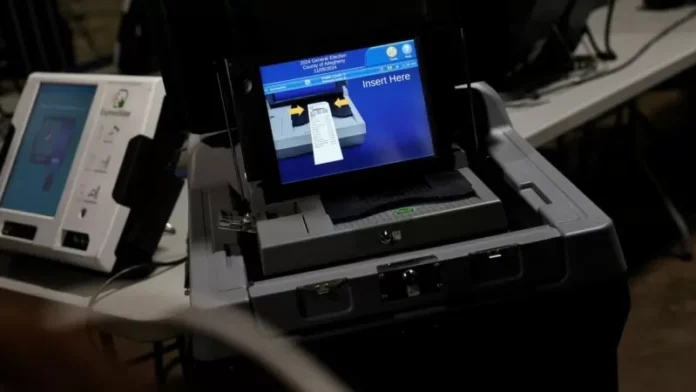Washington – With the U.S. presidential election just hours away, U.S. intelligence agencies have issued a dire warning about increased influence operations aimed at dividing Americans and undermining trust in the election process. The warning comes as millions of Americans head to the polls to cast their votes, and it highlights the need for vigilance and caution in the face of a flood of fake videos and articles meant to incite outrage and inflame tensions.
The statement, issued late Monday by the Office of the Director of National Intelligence, the FBI, and the Cybersecurity and Information Security Agency (CISA), specifically points to Russia as the most active threat. According to the warning, Russian actors are manufacturing videos and creating fake articles to undermine the legitimacy of the election, instill fear in voters, and suggest that Americans are using violence against each other due to political preferences.
The warning also anticipates that Russian actors will continue to release manufactured content with these themes through election day and in the days and weeks following. These efforts, if successful, could incite violence, including against election officials.
This latest warning follows a series of declassified assessments issued by U.S. intelligence officials in the weeks and months leading up to the election. While most votes have been cast without issue, organizations representing state election officials have cautioned that there may be some disruptions, such as voting locations opening late, long lines, or power outages.
In addition to the warning about Russian influence operations, CISA has also observed small-scale incidents, including attempts to take down official election websites with distributed denial of service attacks, as well as several attempts to damage or destroy ballot drop boxes.
The most recent declassified assessment, issued just two weeks ago, warned that Russia, Iran, and China “remain intent on fanning divisive narratives to divide Americans and undermine Americans’ confidence in the U.S. democratic system consistent with what they perceive to be in their interests.” It also warned that intelligence obtained by U.S. agencies has made them increasingly confident that Russia is engaging in plans aimed at inciting violence, and that Iran may follow suit.
The information shared in this new warning builds on that assessment, pointing to a flurry of new activity linked to Russia. Specifically, the statement blames Kremlin-linked actors for posting and amplifying an article falsely claiming that U.S. officials in key states are orchestrating a plan to rig the election by using tactics such as ballot stuffing and cyberattacks. It also links Russian actors to a video of a fake interview with an individual claiming a scheme in the state of Arizona to tip the vote in favor of Democratic presidential candidate Vice President Kamala Harris with fake overseas ballots and doctored voter rolls.
U.S. intelligence agencies have already attributed responsibility for other social media videos to Russian influence actors, including two last week claiming to show Haitian immigrants voting multiple times and purporting to show ballots in Pennsylvania being ripped up.
The latest warning also highlights Iran as a significant foreign influence threat to U.S. elections, citing previous Iranian efforts to hack the campaign of former President Donald Trump.
VOA reached out to the Russian Embassy in Washington and the Iranian Mission to the United Nations in New York for a response to the new U.S. allegations. Both countries have repeatedly rejected previous U.S. assessments of their influence operations. The Russian Embassy in Washington dismissed the newest U.S. intelligence warning as baseless, stating that they have not received any proof for these claims during their communications with U.S. officials.
Despite concerns about potential foreign influence operations, CISA expressed confidence earlier on Monday that other foreign efforts to hack into the country’s election infrastructure in order to alter the vote tally would not be successful. CISA Director Jen Easterly stated that she is confident that a technical hack of the election in a way that would materially impact the outcome is not possible, given the multiple layers of safeguards and cybersecurity protections in place.
This confidence is also due to years of preparation by CISA, working with state and local election officials across the United States. These efforts have included more than 700 cybersecurity assessments and hundreds of election exercises and training sessions since the start of 2023. Additionally, none of the state voting systems are connected to the internet, and an estimated 97% of U.S. voters will be casting ballots in jurisdictions that produce paper records as a backup.
Easterly emphasized that the U.S. election infrastructure has never been more secure, and the election community has never been better prepared to deliver safe, secure,

